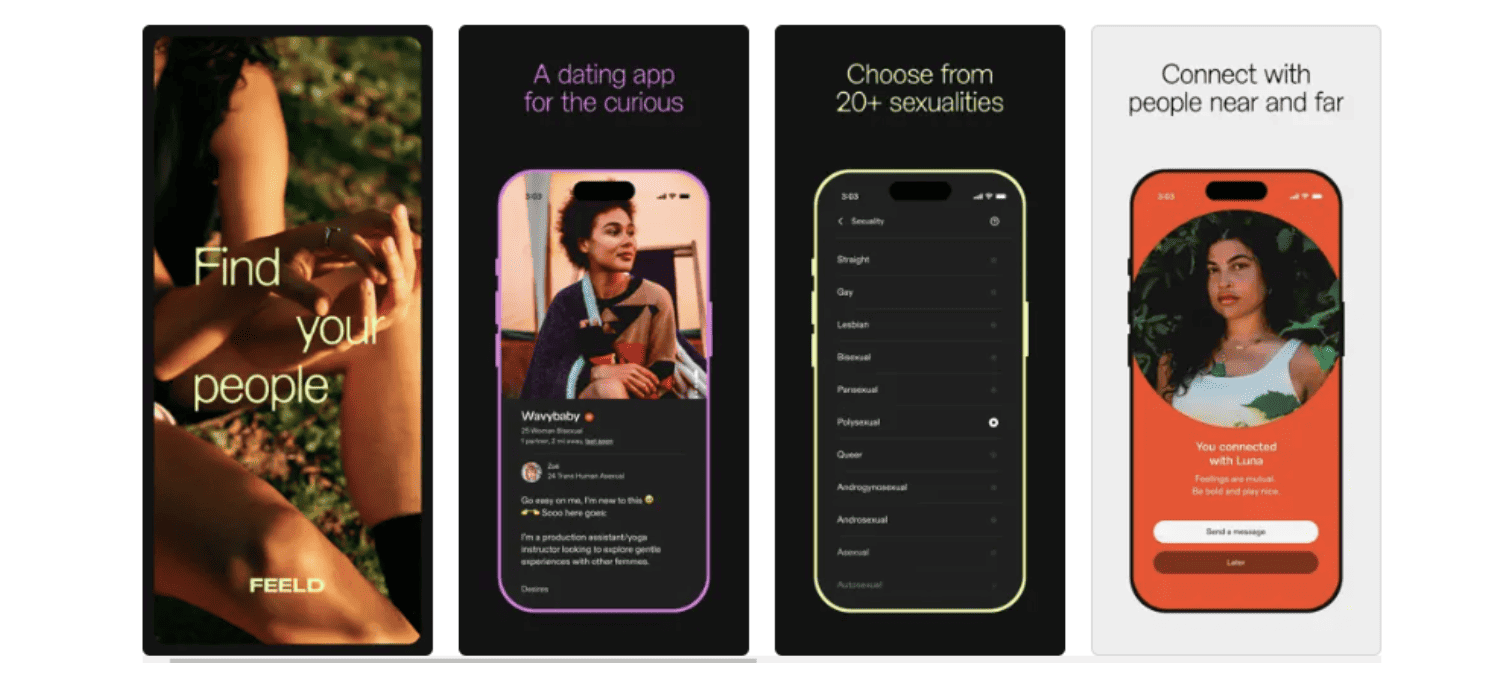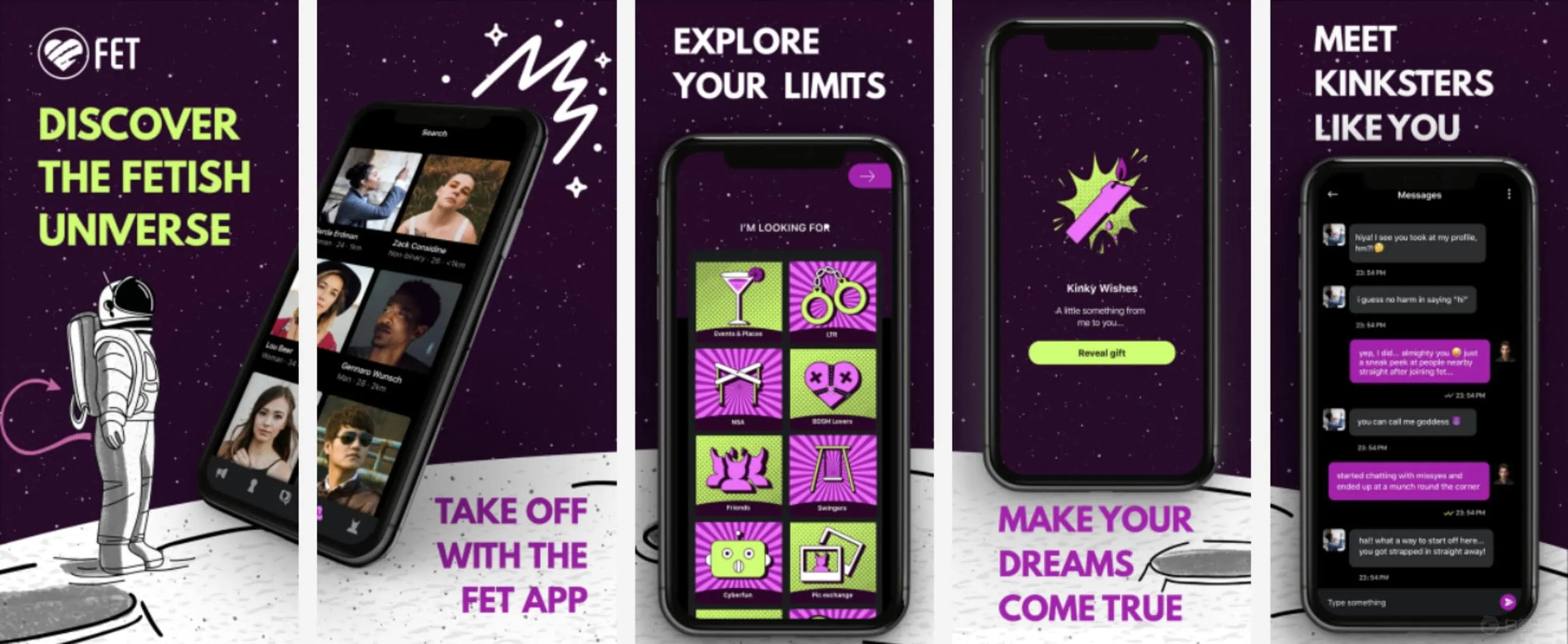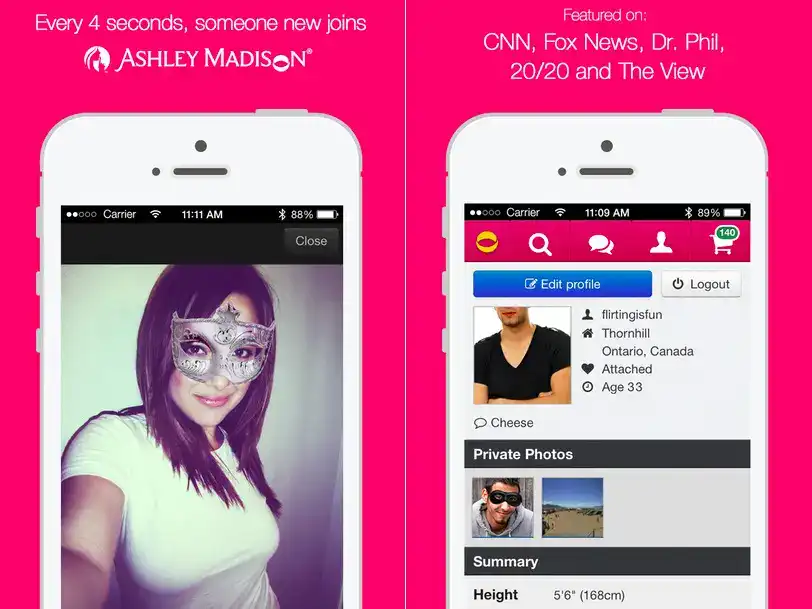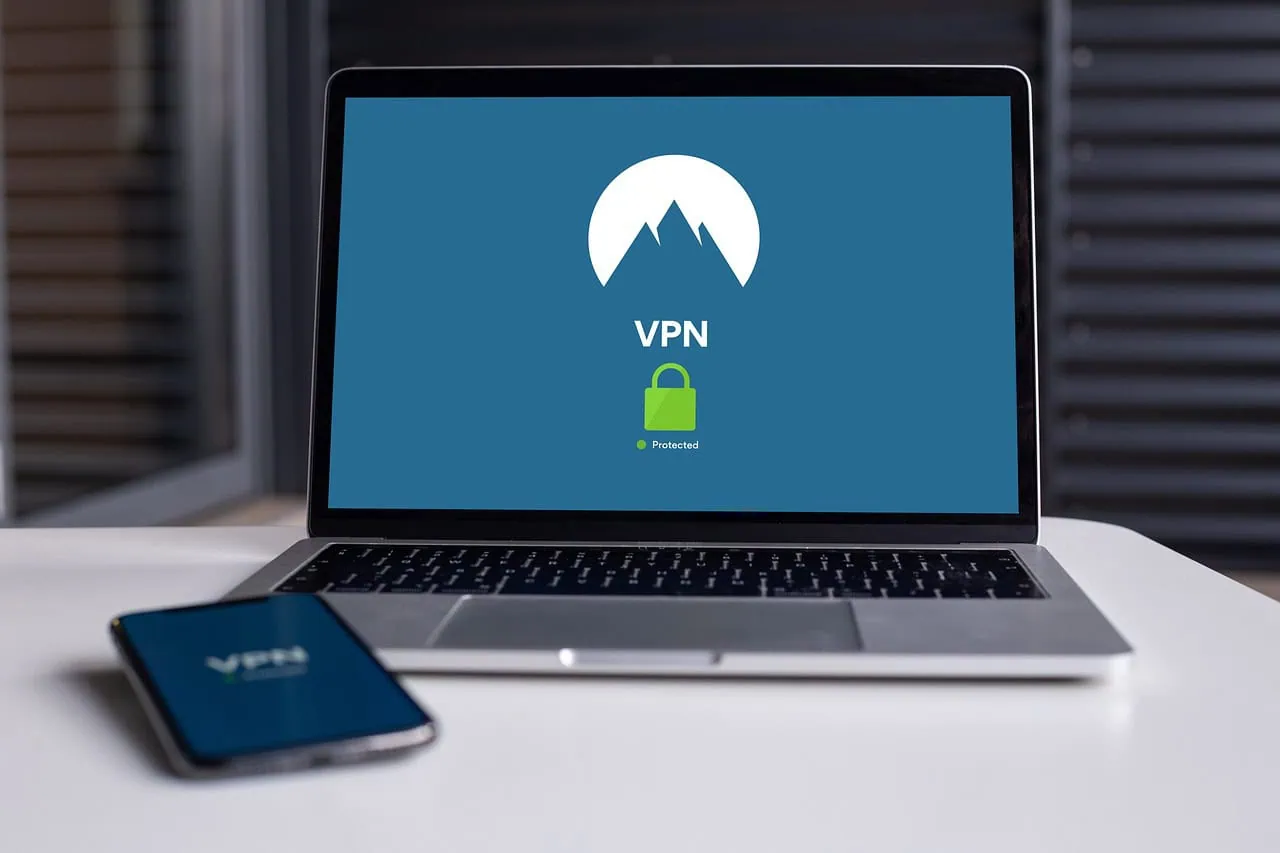Finding someone who shares your alternative lifestyle interests shouldn't mean sacrificing your personal security or having your private information exposed to the world. Unfortunately, recent data breaches affecting over 1.5 million users have shown that many kink dating platforms struggle with basic privacy protections, leaving users vulnerable to identity theft, blackmail, and professional consequences.
| Site | Our Experience | Our Rating | Free Trial Link |
|---|---|---|---|
Best Hookup Site For Men  | Experience Highlights
| 9 | Try AFF For Free |
Best For Relationships  | Experience Highlights
| 9 | Try eHarmony |
2nd Best For Hookups  | Experience Highlights
| 8 | Try Passion |
This guide takes a fresh angle by focusing on privacy protection and personal safety rather than just platform features or matching algorithms. You'll discover how to evaluate dating apps for security risks, protect your identity while building authentic connections, and navigate the unique privacy challenges that come with alternative lifestyle dating. BeyondAges may earn a commission from links at no extra cost to you.
Start your secure kink dating journey with Feeld, which offers the strongest privacy controls and verification systems available today!
Understanding the Privacy Risks in Kink Dating
The alternative dating scene faces unique privacy challenges that mainstream dating apps simply don't encounter, primarily because the stakes are much higher when your personal information gets compromised. Recent security incidents have exposed intimate images and personal details from specialized dating apps, demonstrating that many platforms in this space lack the robust security measures needed to protect sensitive user data.

Why Kink Dating Apps Are Targeted
Cybercriminals specifically target alternative lifestyle platforms because the potential for blackmail and extortion runs much higher when someone's private sexual preferences become public knowledge. Dating platforms often monetize user data by selling it to advertisers or using it for targeted marketing, but with kink-focused apps, this data becomes exponentially more sensitive and valuable to bad actors who might use it for malicious purposes.
The intersection of personal identity and professional reputation creates particularly high stakes for users of these platforms, especially those in conservative industries or communities where alternative lifestyles could impact career advancement or personal relationships. Understanding this landscape helps you make informed decisions about which platforms deserve your trust and personal information.
Recent Security Incidents and Their Impact
A major data leak exposed sensitive user information from five iOS dating apps catering to the LGBTQ+, BDSM, and Sugar Daddy communities when developers left critical security credentials publicly accessible in their code. This incident affected platforms developed by M.A.D Mobile Apps Developers Limited and highlights how quickly things can go wrong when companies cut corners on security infrastructure.
The breach exposed not just usernames and email addresses, but also private messages, photos, and detailed preference information that users had shared in confidence. Many affected individuals faced potential professional consequences, relationship complications, and personal safety concerns when their private information became accessible to anyone who knew where to look.
Evaluating Platform Security Before You Join
Not all dating platforms approach privacy and security with the same level of seriousness, so learning how to assess their protective measures before sharing any personal information becomes crucial for your safety. The most secure platforms implement multiple layers of protection, including end-to-end encryption for messages, strict data retention policies, and regular security audits by independent third parties.
Essential Security Features to Look For
Strong platforms offer robust verification systems that help ensure you're talking to real people while maintaining user anonymity through careful identity confirmation processes. Look for apps that allow you to control exactly what information gets shared and when, rather than platforms that default to sharing everything publicly or with broad user groups.
Two-factor authentication should be standard, not optional, and the platform should offer granular privacy controls that let you hide your profile from specific geographic areas, workplaces, or social networks where you might encounter people who know you professionally. The ability to blur or selectively share photos gives you control over your visual privacy while still allowing for meaningful connections.

Red Flags in Platform Privacy Policies
Be extremely wary of platforms with vague privacy policies that don't clearly explain what data they collect, how long they store it, and who might have access to your information. Companies that claim they "may share information with partners" without specific limitations or that retain your data indefinitely after account deletion should be avoided entirely.
Platforms that require extensive personal information upfront, especially social media connections or detailed location data, often prioritize their business model over user privacy. The most trustworthy apps collect only the minimum information needed for functionality and allow you to gradually share more details as you become comfortable with specific matches.
Building a Secure Dating Profile That Attracts Quality Matches
Creating an authentic yet secure profile requires balancing openness about your interests with protective measures that keep your real identity safe from potential threats. The goal is attracting compatible matches while maintaining enough privacy protection that a data breach or malicious user can't easily connect your dating activity to your offline identity.
Photo Strategy for Maximum Privacy
Use recent photos that accurately represent you, but avoid images that could be reverse-searched to find your social media profiles or professional information. This means skipping photos you've posted elsewhere online and instead taking new pictures specifically for your dating profile that show your personality without revealing identifying details like distinctive tattoos, workplace uniforms, or recognizable backgrounds.
Consider using photos that show your face clearly in the main profile picture, but crop out distinctive clothing, jewelry, or backgrounds that might help someone identify your location or workplace. Additional photos can focus on your interests and lifestyle without including your face, giving matches a sense of your personality while maintaining visual privacy.

Information Sharing Guidelines
Share enough about your interests and preferences to attract compatible matches without providing details that could be used to identify or locate you in real life. This means being specific about your kink interests and relationship goals while avoiding mentions of your employer, specific neighborhood, favorite regular hangouts, or other identifying lifestyle details.
Create a separate email address exclusively for dating that doesn't include your real name or connect to other online accounts. Use this email consistently across your dating activities to compartmentalize this aspect of your life from your professional and social media presence. Never share your primary phone number, home address, or workplace information in your initial profile or early conversations.
Safe Communication and Meeting Practices
Moving from online conversations to real-world meetings requires careful attention to personal safety, especially when exploring intimate topics with people whose backgrounds you can't fully verify. Successful kink dating involves building trust gradually while maintaining protective boundaries that keep you safe throughout the process.
Protecting Your Identity During Initial Conversations
Keep conversations within the dating platform's messaging system until you've established genuine trust and compatibility with someone, because moving to external communication apps often means sharing phone numbers or social media accounts that reveal more personal information. When you do decide to move conversations off-platform, consider using messaging apps that offer disappearing messages or don't require sharing your primary phone number.
Be cautious about sharing photos that weren't already in your profile, especially intimate or explicit images that could be used for blackmail or revenge if the connection doesn't work out as hoped. Even with trusted matches, consider that screenshots can be taken and stored indefinitely, so only share content you'd be comfortable with potentially becoming public knowledge.

Vetting Potential Matches Thoroughly
Take time to have multiple meaningful conversations that go beyond just sexual interests to get a sense of someone's overall character, communication style, and respect for boundaries. People who pressure you for personal information, meetings, or intimate content before you're comfortable often don't respect boundaries in other areas of interaction.
Ask specific questions about their experience with alternative lifestyles, how they approach consent and communication, and what their expectations are for different types of connections. Someone who gives vague answers, becomes defensive about their history, or seems to have unrealistic expectations about immediate intimacy may not be the safest choice for exploration.
Platform Comparison for Privacy-Conscious Users
Different platforms approach privacy and security with varying levels of sophistication, so understanding which apps prioritize user protection helps you make informed decisions about where to invest your time and personal information.
Feeld: Leading Privacy Protection
Feeld has distinguished itself through comprehensive privacy features that include the ability to hide your profile from Facebook friends, blur photos until you grant specific access, and maintain complete control over what personal information gets shared with matches. The platform uses end-to-end encryption for messages and offers robust blocking and reporting tools that help maintain a safer community environment.

The app allows you to link with partners while maintaining separate profiles, which is particularly valuable for couples exploring together while maintaining individual privacy controls. Verification systems help ensure you're interacting with real people while the platform maintains strict policies against sharing user data with third parties for marketing purposes.
| Pros | Cons |
|---|---|
| ✓ Strong encryption and privacy controls ✓ Photo blurring until mutual consent ✓ Robust verification without compromising anonymity ✓ Excellent moderation and reporting tools ✓ Partner linking with separate privacy controls |
✕ Smaller user base in some locations ✕ Advanced privacy features require premium ✕ Learning curve to use all privacy tools |
FetLife: Community-Focused with Privacy Challenges
FetLife operates more as a social network than a traditional dating app, which creates both opportunities and risks for privacy-conscious users. The platform offers extensive community features and educational resources, but requires more careful personal information management because of its social networking structure and the visibility of user activity across the platform.

While FetLife allows pseudonyms and doesn't require real names, the interconnected nature of the community means that your activity patterns, friend connections, and group participations can potentially be used to piece together your real identity. The platform has faced criticism for data retention practices and limited user control over information deletion.
| Pros | Cons |
|---|---|
| ✓ Extensive community resources and education ✓ Strong alternative lifestyle focus and acceptance ✓ Detailed preference and interest categorization ✓ Active forums and discussion groups ✓ No real name required |
✕ Fewer privacy controls than newer platforms ✕ Social network structure raises exposure risk ✕ Hard to fully delete account information ✕ Less sophisticated security infrastructure ✕ Public feeds can reveal behavior patterns |
Ashley Madison: Discretion-Focused Platform
Ashley Madison has rebuilt its reputation around privacy and discretion following its high-profile 2015 data breach, implementing significantly stronger security measures, including end-to-end encryption and improved data handling practices. The platform caters to people seeking discreet connections, which aligns well with privacy-conscious kink dating needs.

The site offers traveling mode for location privacy, discreet photo sharing options, and payment methods designed to maintain financial privacy. However, the platform's focus on affairs rather than alternative lifestyles means you'll need to filter through many users who aren't specifically interested in kink relationships.
| Pros | Cons |
|---|---|
| ✓ Strong discretion and privacy focus post breach ✓ Travel mode for location privacy ✓ Discreet payment and billing options ✓ Photo sharing controls and blurring ✓ Active privacy-conscious user base |
✕ Community not specifically kink-focused ✕ Smaller share of alternative lifestyle users ✕ Most privacy features are behind premium ✕ Historical reputation concerns remain ✕ Limited kink-specific matching |
Quick Comparison Table
Here's a comprehensive comparison of kink dating platforms focusing on privacy and security features for safe exploration.
| Site or App | Best For | Key Features | Starting Price | Free Version | Notable Downside | |
|---|---|---|---|---|---|---|
| Feeld | Privacy-conscious exploration | End-to-end encryption, photo blurring | $11.99/month | Yes, limited | Smaller user base | |
| FetLife | Community learning | Educational resources, forums | Free | Yes, full access | Limited privacy controls | |
| Ashley Madison | Maximum discretion | Traveling mode, discreet billing | $49.99 for credits | No | Not kink-specific | |
| Fetish.com | Kink-specific matching | Detailed preferences, video chat | $29.95/month | Yes, very limited | Outdated interface | |
| AdultFriendFinder | Casual connections | Large user base, video features | $19.95/month | Yes, limited | Poor privacy track record |
Creating Multiple Layers of Personal Protection
Beyond choosing the right platform, implementing personal security practices creates additional protection layers that help safeguard your privacy even if individual platforms experience security problems. Think of this as building a comprehensive defense strategy rather than relying on any single protective measure.
Digital Compartmentalization Strategies
Create completely separate digital identities for your alternative lifestyle dating that don't connect to your primary online presence through shared passwords, recovery emails, or device synchronization. Use a dedicated browser or browser profile that doesn't sync with your other online accounts and regularly clear browsing data to avoid creating digital fingerprints that could link your activities.
Consider using a VPN service when accessing dating platforms to mask your true location and IP address, especially if you live in a small community where discretion becomes particularly important. This additional layer of protection helps prevent platforms from building detailed location profiles that could inadvertently reveal your home or workplace.

Financial Privacy for Premium Features
Use prepaid cards or digital payment services that don't directly connect to your primary banking accounts when purchasing premium features on dating platforms. This approach protects your financial privacy and prevents dating app charges from appearing on statements that might be seen by partners, family members, or others who review your financial activity.
Some platforms accept cryptocurrency payments, which can provide additional privacy protection for users who are particularly concerned about financial discretion. However, ensure you understand the tax implications and legal considerations of cryptocurrency use in your jurisdiction before choosing this payment method.
Recognizing and Avoiding Common Threats
The alternative lifestyle dating scene, unfortunately, attracts various types of predatory behavior, from financial scams to blackmail attempts, making threat recognition skills essential for safe participation. Understanding common attack patterns helps you identify suspicious behavior before you become a victim.
Identifying Blackmail and Extortion Attempts
Be extremely wary of anyone who quickly pushes for explicit photos, personal information, or offline meetings without building genuine rapport and trust through extended conversations. Scammers often create elaborate fake profiles to build false intimacy quickly, then use any shared intimate content or personal information for extortion attempts.
Never share content that includes your face and intimate details in the same image, and be suspicious of anyone who specifically requests this combination or becomes pushy when you maintain boundaries about photo sharing. Legitimate matches respect your privacy boundaries and understand the importance of building trust gradually rather than demanding immediate intimate access.

Spotting Fake Profiles and Catfishing
Fake profiles in the kink dating space often use stolen photos from adult content creators or other dating platforms, so reverse image searching suspicious photos can quickly reveal copied content. Be particularly cautious of profiles with limited photos, extremely attractive images that seem professional, or inconsistencies between photo styles that suggest multiple sources.
Genuine users can usually provide additional verification photos or engage in real-time video conversations when trust has been established, while fake profiles typically make excuses to avoid these verification methods. Trust your instincts if someone seems too perfect, avoids specific questions about their lifestyle experience, or pushes for quick meetings without adequate vetting conversations.
Legal Considerations and Documentation
Understanding the legal landscape around privacy, consent, and digital evidence becomes particularly important when engaging in alternative lifestyle dating where documentation of interactions might become relevant in various legal contexts. While this shouldn't create paranoia, awareness helps you make informed decisions about communication and documentation practices.
Consent Documentation and Communication
Always maintain written records of consent discussions, boundary negotiations, and agreement changes when moving toward intimate interactions with new partners. This documentation protects everyone involved and demonstrates a commitment to ethical practices that helps build trust and safety within the community.
Use dating platforms that timestamp messages and maintain conversation histories rather than moving immediately to apps with disappearing messages, at least until you've established clear mutual consent and boundaries with new partners. This creates a documented foundation for your interactions that can be valuable if questions about consent or boundaries arise later.
Privacy Laws and Data Protection Rights
Understand your rights under data protection laws like GDPR in Europe or CCPA in California, which give you specific rights to know what personal information platforms collect, how they use it, and the ability to request deletion of your data. Exercise these rights regularly by reviewing privacy policies and requesting data deletion from platforms you no longer use actively.
Some jurisdictions have specific laws protecting individuals from revenge porn or intimate image abuse, which can provide legal recourse if someone misuses intimate content you've shared. However, prevention through careful sharing practices remains far more effective than legal remedies after privacy violations occur.
Frequently Asked Questions
What should I do if I think my dating profile information has been compromised in a data breach?
Immediately change your password on the affected platform and any other accounts that use the same password, then monitor your email and financial accounts for suspicious activity over the following weeks. Consider using identity monitoring services and report any attempted blackmail or extortion to both the platform and law enforcement. Document everything and avoid paying any demanded ransoms, as this typically leads to increased demands rather than resolution.
How can I verify someone's identity without revealing my own personal information?
Use video calls through the dating platform or secure apps that don't require sharing phone numbers, and ask for verification photos that show them holding a handwritten note with your name or a specific phrase. Legitimate users understand these precautions and will cooperate with reasonable verification requests. You can also suggest meeting in very public places for initial meetings while maintaining your privacy boundaries until trust is established.
Is it safe to use location features on kink dating apps?
Exercise extreme caution with location sharing, especially precise GPS coordinates that could reveal your home or workplace addresses to other users. If you use location features, set them to show only general areas rather than exact locations, and regularly review which apps have location access on your device. Consider using fake locations or VPN services if you need location-based matching but want to maintain geographic privacy.
What are the warning signs that someone might use my information for blackmail?
Red flags include pushing for intimate photos very quickly, asking for photos that show both your face and intimate details together, requesting personal information like your real name or workplace early in conversations, and becoming aggressive or manipulative when you maintain boundaries. Trust your instincts if someone seems more interested in collecting compromising information than building a genuine connection based on shared interests and mutual respect.
How do I safely delete my information from dating platforms I no longer use?
Follow the platform's official account deletion process, but also contact customer service directly to request complete data deletion and confirmation that your information has been removed from their servers. Download your data first if you want to keep any conversation histories, then delete all photos and personal information from your profile before initiating account closure. Monitor for several months afterward to ensure your profile doesn't reappear and that you're not receiving communications from the platform.
Conclusion
Safe kink dating requires balancing authentic self-expression with smart privacy protection, especially in light of recent security breaches that have exposed millions of users' intimate information. By choosing platforms with strong privacy features, implementing personal security practices, and maintaining awareness of potential threats, you can explore alternative lifestyle connections while protecting your personal and professional reputation. The key lies in taking a proactive approach to privacy rather than hoping platforms will protect you by default.
Protect your privacy while finding meaningful connections by starting with Feeld's industry-leading security features today!
Sources:
https://www.eff.org/deeplinks/2025/07/dating-apps-need-learn-how-consent-works
https://www.malwarebytes.com/blog/news/2025/04/intimate-images-from-kink-and-lgbtq-dating-apps-left-exposed-online https://www.globaldatinginsights.com/featured/multiple-lgbtq-dating-and-kink-ios-apps-see-user-info-leaks/
https://www.thebridgechronicle.com/tech/how-to-use-dating-apps-safely-2025
https://www.techradar.com/pro/security/major-dating-app-data-breach-may-have-exposed-1-5-million-private-user-images-online
When you purchase through links on our site, we may earn an affiliate commission. Here’s how it works.






